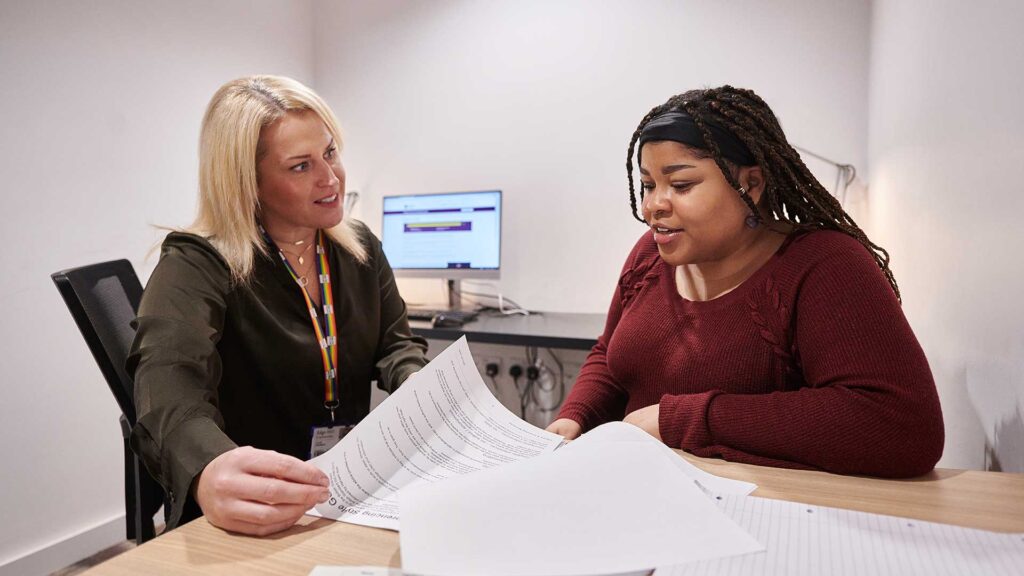A personal statement is your chance to show the universities you’re applying to why you should gain a place on your chosen course. This is a great opportunity to showcase your personality and motivations, but we know this can be a daunting task.
Your personal statement can only be 4,000 characters – which is about 2 sides of A4 so you need to make sure every word counts.
So, we asked our Admissions team what they look for in a personal statement and asked some of our students to share their tips too. Whether you’ve got experience or not, here’s how to make your application stand out from the crowd.
Advice from the experts
No matter what your experience level, there’s certain things we would highly recommend including in your personal statement.
“There are a few key areas we advise applicants to cover and there are many ways to get these across depending on your experience. The main things we want to know about are your motivations to do the course, your academic and personal achievements, your skills and interests and any relevant work experience.”
Eleanor Butcher, Admissions Manager at Edge Hill University
Here’s how you can do it.
Demonstrate your passion and motivation
The first, and arguably most important, thing you need to do is demonstrate passion and enthusiasm for your chosen subject.
Universities don’t expect you to be an expert or have lots of experience in your field, but we do want to hear your reasons for wanting to pursue your chosen degree. Your motivation can come from anywhere and doesn’t have to be from an early age (you might have been inspired reading about the course itself).
Tell us about your goals, let us know how you keep up to date with updates in your industry (we recommend you read around your subject to demonstrate your commitment), or reach out to our current students who will be happy to chat to you in more detail and give you some great insights to include.
“Being honest and open about your ambitions is a good start to your UCAS application. At the end of the day, Universities will want to know about you, what makes you unique, what you are going to do with their course, why you will be a good fit.
“So, by being open about why you are applying will be a good way to communicate passion about your chosen subject.”
Hannah, BA (Hons) Childhood and Youth Studies
Show off your skills and achievements
Whether your achievements are personal, work based or from your time at school – be bold and showcase your achievements. Sharing the achievements you’re really proud of helps the admissions team to get to know you as a person before they even meet you.
While exam results are important, we also want to know what makes you, you.
“It’s not all about grades, we want to know about other achievements, academic or otherwise. Share with us what makes you unique, any challenges you’ve overcome or independent learning you’ve undertaken – this helps us to get to know you and why you want to do the course.”
Chris Yates, Admissions Manager at Edge Hill University
Sharing these insights helps admissions teams to get a clearer picture of who you are and whether you’re suited to your chosen course – so make this section count.
When thinking about your skills, highlight those that align with your chosen degree and include how you’ve demonstrated those skills.
Some great examples of skills that benefit a range of subjects include:
- Communication
- Time management
- Team work
- Critical thinking
- Independent learning & research
Showcase your experience

Admissions teams are keen to hear about any work experience you might have, either course specific or otherwise.
There are many different types of experience you can include here, like voluntary work, part time jobs, virtual experience (such as Springpod, Uptree, Barclays Life Skills and more).
If you do have subject relevant experience (like a placement for example), this is where to delve deeper and explain how it has inspired you to pursue a degree. Use this section to share with us what you have learned.
Your experience doesn’t have to be related to the subject to be relevant though. You may have worked in retail and gained strong communication and problem-solving skills or in hospitality so can work well under pressure.
Transferrable skills will certainly help you in your university life, and will boost your application too.
If you’ve got very little or no work experience
We understand that not everyone will be in a position to undertake voluntary work or have had the chance to undertake work experience. So, Emma our Senior Admissions Manager has shared her advice if this is the case.
“If applicants don’t have work experience, I would be looking for them to articulate the transferable skills they have from their current studies – like organisation, time management, presentation, teamwork.
“I would also expect them to talk about their chosen subject, aspects they find particularly interesting/enjoyable, and share if they have completed any projects or carried out their own research.”
Emma Hall, Senior Admissions Manager, Edge Hill University
If you’ve not got much experience, you might need to think outside of the box and transferrable skills are a great place to start.
Find transferrable skills from outside of work
You’ll have gained plenty of useful skills throughout your school and personal life, even without realising, which we’re really interested in hearing about. If you’re not sure on what these are, then follow Findlay’s advice.
“When writing my UCAS Application, I made sure to ask my teachers at the time for any qualities or skills that they saw in me that they believed I should include – this was helpful because sometimes you can’t see them in yourself.”
Findlay, BA Film and Broadcast Production Student
There are so many different aspects of your life that have given you the skills to succeed, so think carefully about your personal life and the way it can relate to your chosen programme.
Taken care of younger siblings? You’ve developed responsibility, multitasking and problem-solving skills. Play an instrument? You’ve probably developed patience, creativity and self-discipline. Involved in a sport? You have communication skills, the ability to work under pressure and resilience.
“Try to include anything that could be relevant no matter how big or small it is. It might only seem like a little thing to you, but it could really impress people reading it.
“If you have read any books or watched something that may be relevant to your course it could be helpful to include this, as long as you include what you’ve learnt and why you feel it’s relevant.”
Chloe, BA Film and TV Student
Give yourself enough time to get it right
You might need to do multiple drafts of your personal statement to get it right, so make sure you leave yourself plenty of time to complete this important section of your application.
It’s great to get others to look over your work to check if anything is missing and look for typos and grammatical mistakes that are easily overlooked.
Overall, your personal statement should tell us who you are, what motivates you and show your enthusiasm and passion for your chosen subject. So, it’s worth taking the time to get it right.
At our open days, we offer personal statement talks and drop ins where you can access support from our expert admissions team, so come along and visit us or contact [email protected] for more information.
August 8, 2024



